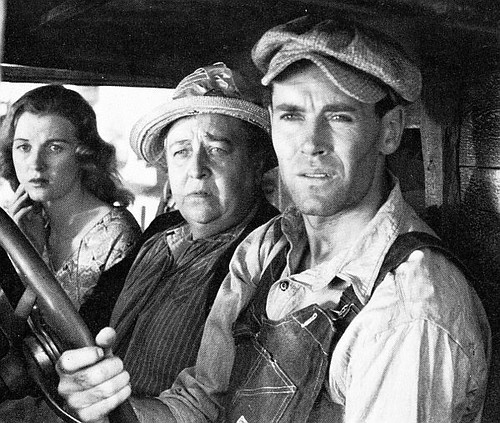
I posted the fascinating email exchange that a member had with a union organizer. One of the organizer’s claims commits a form of the equivocation between the dollar and the gun—i.e., between economic power and political power.
It has helped me to a deeper understanding of the equation of the dollar with the gun: it is the fallacy of regarding the values achieved by others as a threat to oneself.
When named that way, it sounds bizarre—except psychologically, where we do understand it. Psychologically, the envy-ridden loser fears and hates the achievements of others because those achieved values confront him with his own self-made failures.
Values as threats is the meaning of the union organizer’s claim that workers need collective bargaining to gain “bargaining power.” Otherwise the employer has all the bargaining power.
This kind of stuff works by cartoon thinking:

You can’t see there the face of the supplicating “little guy.” But we all know the image of “the downtrodden” from the movie of “Grapes of Wrath”:

The employer’s “power” is the power of the dollar, not the power of the gun. It is the power to offer payment. It’s the power to offer some of one’s achieved values in trade. It’s the power to pay you.
But what about “bargaining power”? Presumably, that’s a greater ability to dictate the terms of an exchange.
Logically, all trades are win-win.
Morally, there’s no principle concerned with comparing the wins of each party. The outcome of buyer gaining ten times what the seller gains is just as moral as the reverse. And rarely acknowledged is that everyone is both buyer and seller.
Economically, negotiations for business expenses such as wages and salaries are not governed by emotions (greed or pity), but by the facts (the worker’s contribution to production). But in the sticky spider web of Leftist economics behind the “bargaining power” conception, let me set the metaphysics right-side up.
If “bargaining power” means the ability to fine-tune the terms of the deal in one’s favor, then the poorer you are, the greater your bargaining power.
No, that’s not a typo. If we’re talking about an individual deal made between a rich person and a poor one, then dollar for dollar the poor man has greater power.
Why? It has to do with the proportionality of the value of a dollar.
To a billionaire, $1000 is essentially nothing. It’s one one-millionth of his wealth. That’s below his threshold of even thinking about (see my post on thresholds).
To a person of middle income, $1000 is a figure to be reckoned with. It is maybe a week’s income.
To a penniless immigrant, $1000 is everything.
So you want to trade with people much, much richer than you. The poorer person has an advantage: amounts of money that are big to him are small to the wealthy—and the wealthier they are, the smaller that amount of money is to them.
Everyone knows this on some level. If you want to sell your services as a chauffer, are you more likely to be hired by someone as poor as you or someone wealthy? And if you are hired, is it more in your financial interest to work for the comfortably wealthy or for the super-rich?
The less wealth you have compared to your potential trading partner, the more bargaining power you have.
The values possessed by others are what they have to pay you with. The more they have, the better for you. Out of sheer, naked greed, you should wish everyone to get rich. You should want them to have so many cars, yachts, homes, computers, and rockets to space that they wouldn’t at all mind giving one or two to you.
Remember the old expression, “He’d give you the shirt off his back”? That was from a time when you couldn’t just call an Uber to take you to a nearby Walmart to buy a replacement shirt for $15. What made the difference? We’ve got more stuff—and more ability to make still more stuff. All of us have a whole lot more wealth.
The fact that others have earned a lot of values is immensely valuable to you.
Back to the union organizer on a different aspect: the issue of individual, one-to-one hiring vs. collective bargaining.
Collective bargaining decreases your bargaining power.
If you are negotiating one-to-one with someone hiring you, you can ask for more than the average. If your ability is above average, you’ll probably get it. But if the employer has to deal with all of his employees as a block, you can’t get more than the average.
This supplies the answer to a question that puzzled me about this passage in Atlas:
| “We all have the same problems, the same interests, the same enemies. We waste our energy fighting one another, instead of presenting a common front to the world. We can all grow and prosper together, if we pool our efforts.” “Against whom is this Alliance being organized?” a skeptic had asked. The answer had been: “Why, it’s not ‘aga inst’ anybody. But if you want to put it that way, why, it’s against shippers or supply manufacturers or anyone who might try to take advantage of us. Against whom is any union organized?”
“That’s what I wonder about,” the skeptic had said. |
||
For many decades I couldn’t figure out against whom unions are organized. Now I see the answer: collective bargaining is aimed at those with higher-than-average ability. If the aim is to force the employer to pay one wage rate for everyone having the same “seniority,” then the employer can’t discriminate on the basis of productiveness.
This means the more productive are forced to subsidize the less productive.
Of course, some unions don’t operate that way. And all unions do some things, however sporadic and meager, to provide real benefits to all that are not a part of the aforementioned “leveling.” Those things don’t change the fact that collective bargaining reduces the rewards for those with greater productive ability.
Not only is that disgustingly unjust, it holds back the rise in living standards across the economy.
So you see that underneath the simple claim that workers need to organize in order to pose a counterforce to the huge bargaining power of the fat cats, there is an entire, inverted, irrational philosophy.

